Curious about Bún Riêu in Hanoi? Our 2025 guide explores this flavorful crab noodle soup, explains how it’s different from Bun Cha, and shows you the best spots in the Old Quarter to savor an authentic bowl.
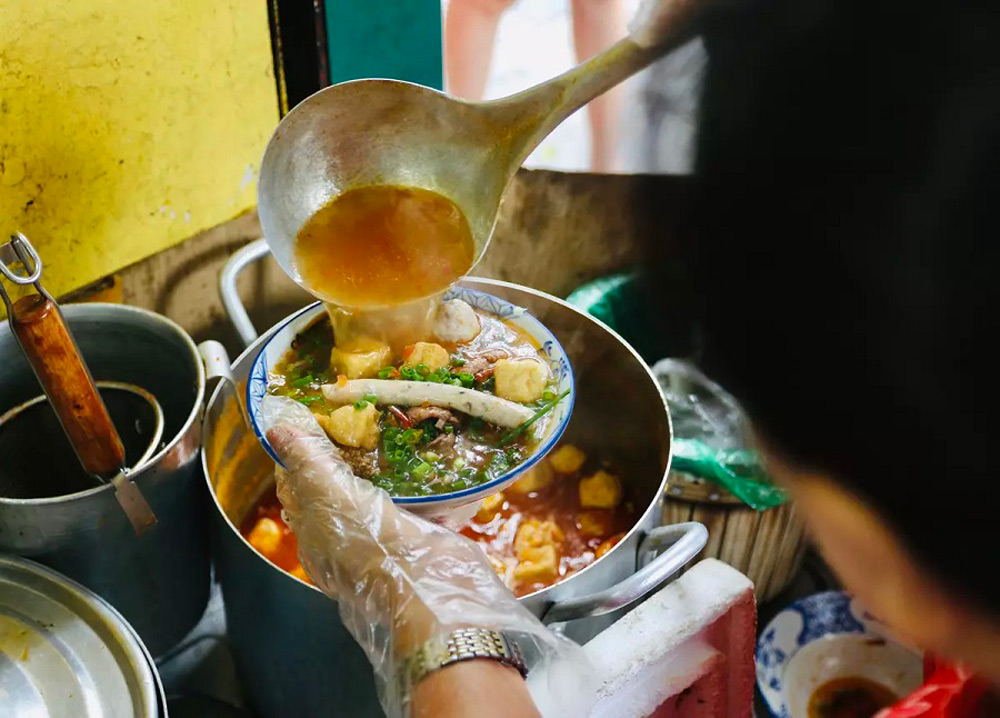
Pho might be Hanoi’s claim to fame, but if you’re after something bold and unforgettable, Bún Riêu takes the spotlight. Picture a steaming bowl of crimson broth, fragrant with tomato and crab, topped with soft, flavorful crab cakes, fresh herbs, and a touch of tangy seasoning. Every spoonful bursts with layers of flavor, making it one of the city’s most beloved dishes.
This guide is your go-to resource for experiencing Bún Riêu Hanoi like a local. We’ll break down what makes this crab noodle soup so special, clarify how it differs from other famous Hanoi dishes like Bun Cha, and share the best spots in the Old Quarter where you can savor a truly authentic bowl. Get ready for a culinary adventure you won’t forget.
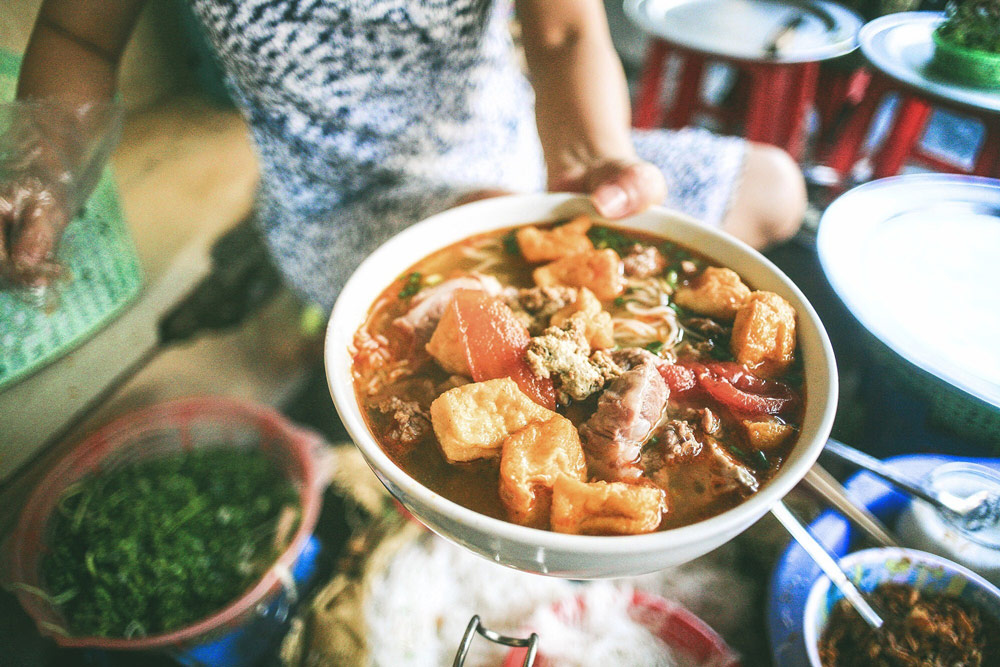
If you’re new to Hanoi’s vibrant food scene, it’s easy to mix up Bún Riêu and Bún Chả, they both start with “bún,” but that’s where the similarity ends. Let’s break it down so you know exactly what you’re ordering.
Bún Riêu is a bright, tangy, and savory soup that steals the show. Its base is a tomato-and-crab broth that’s both rich and fragrant, often topped with fluffy crab paste, golden fried tofu, and a generous pile of fresh herbs. Soft rice noodles complete the bowl, making each spoonful a perfect balance of flavors. This is the dish you want if you’re craving something soupy, hearty, and distinctly Hanoi.
Bún Chả, on the other hand, is a completely different experience. It features smoky grilled pork patties and slices served alongside a tangy dipping sauce, a plate of rice noodles, and fresh herbs. Unlike Bún Riêu, it’s not a soup. Prices typically range from 40,000–60,000 VND per serving (around US$2-3 per person), depending on the spot.
The Key Takeaway: When in Hanoi, remember: Bún Riêu = crab noodle soup. Bún Chả = grilled pork with noodles. Two iconic dishes, two totally different adventures for your taste buds.
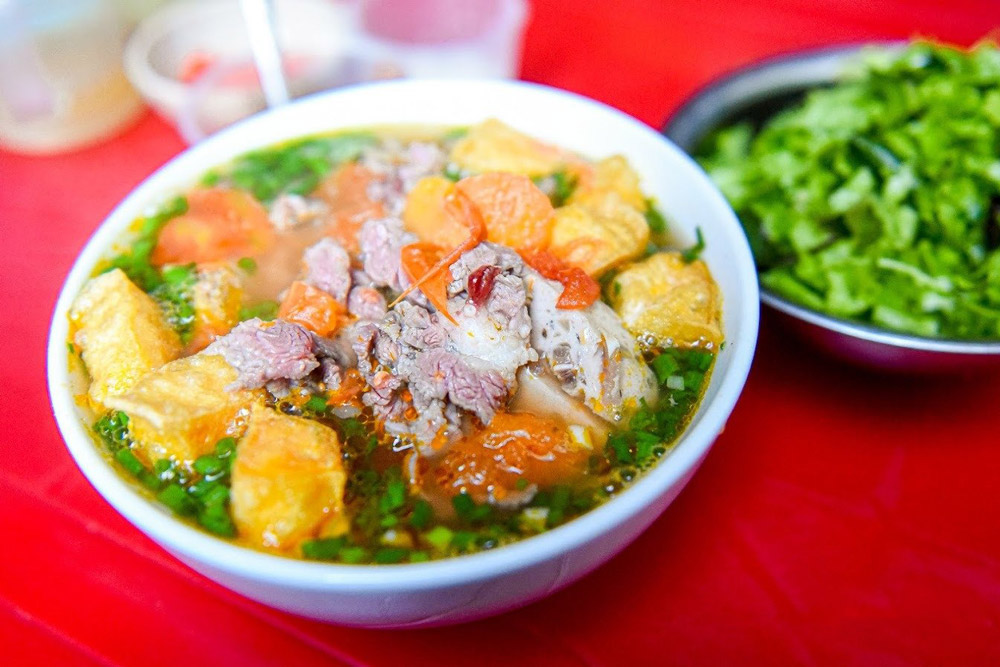
To truly appreciate Bún Riêu Hanoi, it helps to understand each element that makes this crab noodle soup so iconic. Every bowl is a carefully balanced combination of flavors, textures, and aromas that together define Hanoi’s culinary style.
The heart of Bún Riêu is its broth—a light, tangy, yet deeply savory liquid. Its signature reddish hue comes from ripe tomatoes and a touch of annatto seed oil, while the rich flavor comes from a slow-cooked pork and crab base. Every spoonful delivers a perfect mix of freshness, umami, and subtle sweetness that sets the stage for the other ingredients.
So, what does “riêu” mean in Vietnamese? It refers to the soft, cloud-like cakes made from pounded freshwater crab meat mixed with egg. Floating gracefully on the surface, these delicate cakes are the essence of Bún Riêu Cua Hanoi—creamy, savory, and full of flavor. They’re the ingredient that gives this dish its character and makes it unforgettable.
Bún Riêu isn’t just about broth and crab cakes. Typical additions include:
No bowl is complete without fresh herbs and bold condiments. Banana flower, perilla leaves, and other greens add freshness and crunch, while lime or kumquat juice, chili paste, and the famously pungent yet delicious shrimp paste (mắm tôm) elevate the flavor to a uniquely Hanoi experience. These final touches let you tailor each bite to your taste, balancing sour, spicy, and savory notes perfectly.
A bowl of Bún Riêu Cua is more than food—it’s a multi-sensory journey through Hanoi’s flavors, textures, and traditions, giving you a deep taste of the city in every spoonful.
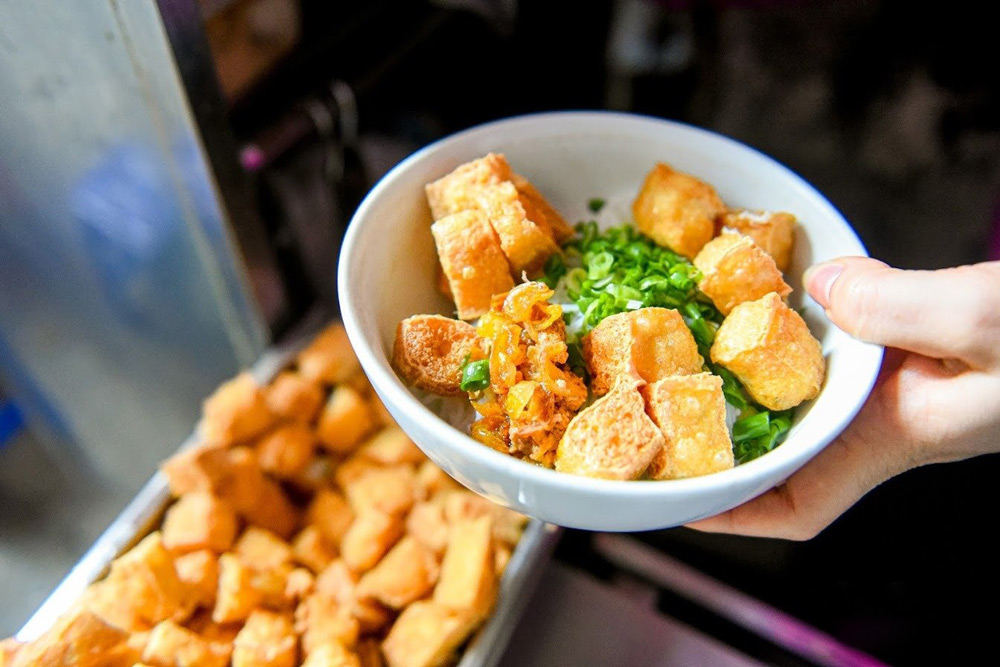
If you’re ready to dive into Hanoi’s vibrant bún riêu scene, the first rule is simple: skip fancy restaurants. The true magic of this crab noodle soup is found at humble street stalls and small local eateries that have been perfecting their craft for decades. Look for bubbling cauldrons of rich, reddish broth and you know you’ve found a winner.
Hai Ba Trung District is a treasure trove for bún riêu lovers, offering a wide range of styles from traditional to inventive:
Bun rieu Huyen Beo: A quiet, local spot that feels like a hidden gem. Minimal online presence makes it perfect for those wanting an authentic, neighborhood experience.
Bun rieu cua top mo Co Oanh: Famous for its crispy pork fat topping, this stall is for adventurous eaters who love texture and richness in every bite.
Bun rieu Huong Beo: A modern take on the classic, featuring creative toppings like crispy pork balls. While innovative, some diners feel the broth lacks depth and is slightly MSG-heavy, so it’s a mixed but fun experience.
Bun rieu cua Binh Huyen: A lively sidewalk stall with tangy broth enhanced by fermented rice vinegar. Some find the crab cakes a bit firm, but the vibrant street atmosphere is part of the charm.
Bun rieu Tuan Anh: Spacious, clean, and family-friendly, this place offers diverse toppings and a naturally sweet, MSG-free broth—a great choice for health-conscious diners.
Moving into the Old Quarter and surrounding streets, you’ll find stalls known for both their history and unique styles:
Bun rieu oc: This one is a true culinary quest. Skip the decoy stall at the alley entrance; the hidden cart deeper inside serves up the real deal, often selling out early in the morning.
Bun Rieu Soc: Operating exclusively at night, this stall serves rich broth with tender cartilage ribs and homemade fried shallots. Individual bowls or a crab hotpot make it perfect for both solo diners and groups.
Bun rieu của 41 Quang Trung: Legendary addresses with decades of history. The Quang Trung location has seen quality fluctuations, while 50 Nguyễn Du remains a beloved spot for traditional flavors and friendly service.
Bun rieu Dong Xuan Market: Dining here is about the full experience—the market atmosphere, the customizable bowls, and affordable prices all combine to make a memorable visit.
Bun rieu Ba Thiep: Home to the multi-generational Ba Thiep legacy, this stall serves a light, clean broth and high-quality ingredients.
With so many options, here’s how to plan your bún riêu adventure:
No matter which path you choose, each bowl of Bún Riêu in Hanoi tells a story—of local tradition, regional flavors, and decades of culinary craft. Follow your senses, and you’ll discover why this crab noodle soup has earned its legendary status.
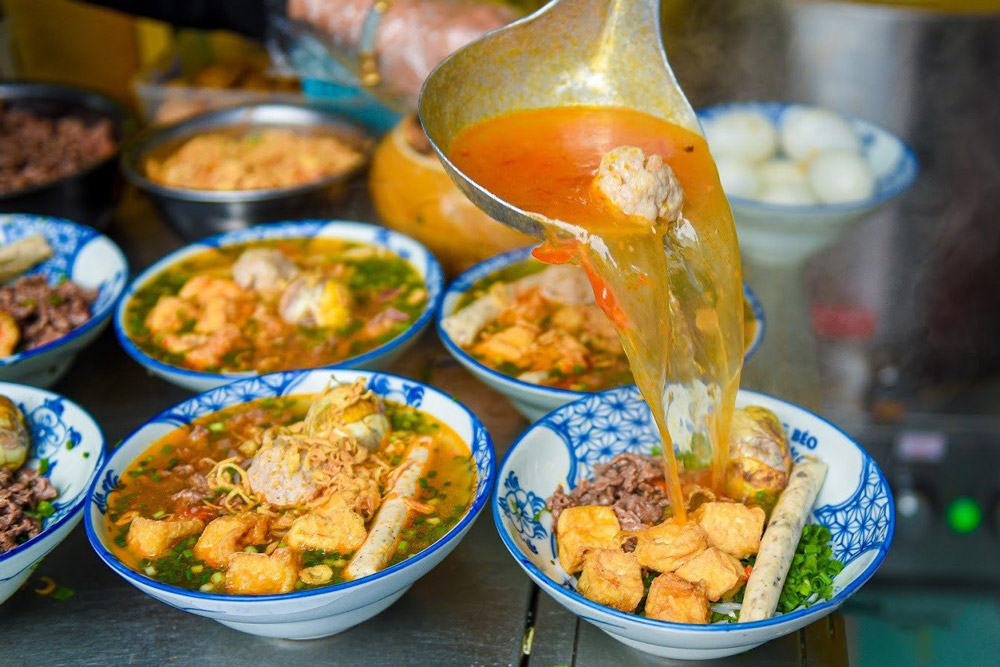
If you love cooking and want to bring a taste of Hanoi into your kitchen, trying your hand at a Bun Rieu Hanoi recipe is a truly rewarding challenge. The magic of this dish lies in the riêu—soft, cloud-like crab cakes made from fresh crab meat and eggs—floating atop a tangy, savory, and slightly sweet tomato-based broth. Balancing these flavors takes a little practice, but it’s what makes Bun Rieu so iconic.
While you can find recipes online, nothing beats learning the authentic techniques from a local expert. Taking a cooking class in Hanoi not only teaches you how to recreate the dish perfectly, but also gives insight into the culture, ingredients, and traditions that make this humble crab noodle soup a staple of the city’s cuisine. Whether you’re a seasoned home cook or a curious foodie, mastering Bun Rieu Hanoi is a delicious way to extend your culinary adventure beyond the streets of Hanoi.
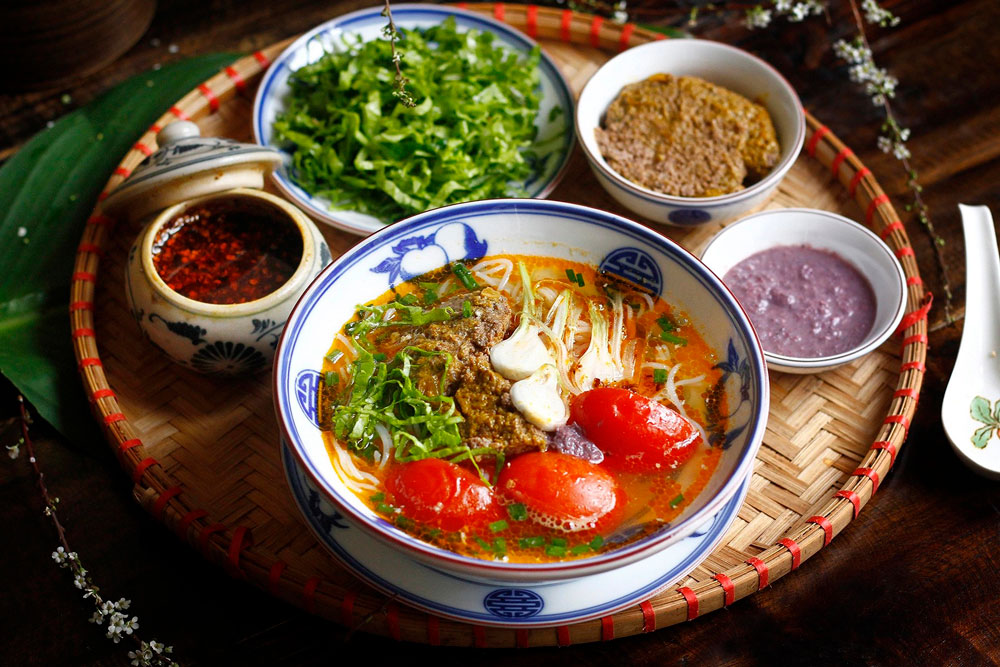
Yes! While versions of Bún Riêu can be found across Vietnam, the tangy, tomato-and-crab broth served with fresh dill and a hint of shrimp paste is a true specialty of Hanoi and the northern Red River Delta. It’s the northern take on this iconic crab noodle soup that locals and visitors love.
They may sound similar, but these dishes couldn’t be more different. Bún Riêu is a vibrant crab noodle soup, served with soft rice noodles and fragrant herbs. Bún Chả, on the other hand, is grilled pork served with noodles and a separate dipping sauce. One is a hearty soup, the other a flavorful grilled experience—both essential Hanoi dishes, just don’t mix them up!
“Riêu” refers to the soft, savory cakes made from pounded crab meat and egg that float on top of the soup. These delicate crab cakes are the heart of the dish, giving it its unique texture and flavor.
Absolutely! A bowl is generally balanced, offering protein from crab and tofu, carbohydrates from the rice noodles, and vitamins from the tomato-rich broth and heaps of fresh herbs. It’s nourishing, flavorful, and satisfying—a wholesome taste of Hanoi in a bowl.
Chả Cá Thăng Long is another celebrated Hanoi specialty, but it’s completely different. This dish features turmeric-marinated fish cooked with fresh dill right at your table. Unlike Bún Riêu, it’s not a noodle soup, but a sizzling, interactive meal that’s a must-try for any foodie visiting the city.

Bún Riêu Hanoi may not have the worldwide fame of Pho or Bún Chả, but don’t let that fool you. This vibrant, tangy crab noodle soup is one of the most intricate and satisfying dishes in Hanoi. Each bowl captures the essence of the city’s culinary heart—rich, savory, slightly sweet, and perfectly balanced with fresh herbs and noodles. Tasting it is like taking a small, delicious journey through Hanoi’s culture, tradition, and flavor.
So, don’t be shy—dive in! Squeeze in a little lime, stir in the shrimp paste, and savor each bite. Pull up a stool at a local stall, watch the bustle of the city around you, and experience firsthand why locals consider Bún Riêu one of their most beloved comfort foods. Your taste buds—and your travel memories—will thank you.
Plan Your Hanoi Food Adventure with Ease Want to experience Hanoi’s culinary gems without the hassle of planning transport, finding hidden street food spots, or navigating the city on your own? Asia Mystika, a trusted tour operator in Vietnam, can help you save time and make the most of your trip. From curated food tours to full-day city adventures, they’ll connect you with the best local experiences, including Bún Riêu, so you can focus on tasting, exploring, and enjoying every moment.
Contact Asia Mystika today and turn your Hanoi foodie dreams into reality!
WhatsApp: (+84) 866.22.7878
Planning trip: Click here
Email: sales@asiamystika.com
Website: www.asiamystika.com
Asia Mystika Profile: Click Here